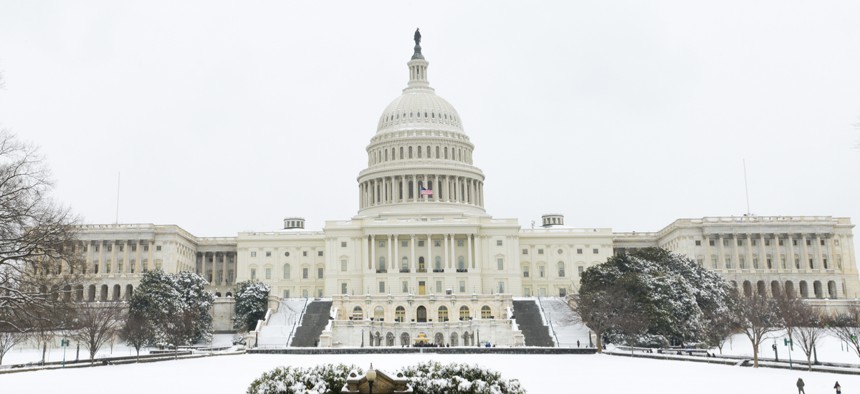Government Shuts Down After Senate Rejects One-Month Stopgap Spending Bill

Orhan Cam/Shutterstock.com
Lawmakers did not come up with an alternate plan in time for the midnight deadline.
A stopgap spending bill stalled in the Senate Friday night, leading to a government shutdown for the first time since 2013.
The continuing resolution funding agencies expired at midnight, and lawmakers were unable to spell out any path forward to keep government open. The Senate on Friday night failed to reach cloture on a four-week spending bill the House had already approved. A majority of the chamber voted in favor of cloture, but the Senate did not clear the 60-vote threshold necessary to proceed.
Senate Majority Leader Mitch McConnell, R-Ky., and Minority Leader Chuck Schumer, D-N.Y., took to the floor shortly after midnight, each assigning blame to the other party for the lapse in appropriations. McConnell said he planned to offer language to change the date of the next continuing resolution to Feb. 8 rather than Feb. 16, the date in the House version that the Senate rejected. McConnell said he could not get a vote on that new date right away, however.
In a statement, the White House dubbed the lapse in appropriations the "Schumer shutdown" and blamed Democrats. "Tonight, they put politics above our national security, military families, vulnerable children, and our country's ability to serve all Americans," the statement said. "We will not negotiate the status of unlawful immigrants while Democrats hold our lawful citizens hostage over their reckless demands. This is the behavior of obstructionist losers, not legislators."
But Schumer said on the floor that Trump earlier Friday had walked away from a bipartisan deal in which Democrats even put the border wall on the table, and called the shutdown the "Trump shutdown." He urged Congress to get back to work Saturday to come up with a deal.
The Trump administration has already begun sending out furlough notifications and undertook “robust” preparations for a shutdown, senior officials said earlier on Friday evening. The immediate impact of a shutdown would be blunted by it taking place over a weekend, but agencies would begin to feel the full effect Monday if a resolution is not yet reached. The Office of Management and Budget told agencies through guidance that “excepted weekend employees should report for work to perform their excepted activities.”
Some agencies are using leftover funds that have not yet expired to further delay the impact of a shutdown, the Trump administration said Friday. Senior administration officials were not certain exactly which agencies would take advantage of such funds, but at least the Federal Communications Commission and the Environmental Protection Agency planned to do so. About 860,000 federal workers would face furloughs once normal shutdown procedures are implemented.
The White House on Friday endorsed ensuring furloughed federal employees receive back pay after the government reopens. Employees working during a shutdown are already guaranteed to receive delayed paychecks.
Federal employee groups were quick to condemn the lapse in appropriations.
“Congress and the administration have only themselves to blame for failing to keep the federal government open," said American Federation of Government Employees President J. David Cox, in a statement. "This shutdown is a direct result of lawmakers continuing to punt the ball instead of having the courage to make the tough decisions that we elected them to do. Federal employees want to go to work. They believe in their mission and want to provide quality services to the American people."






